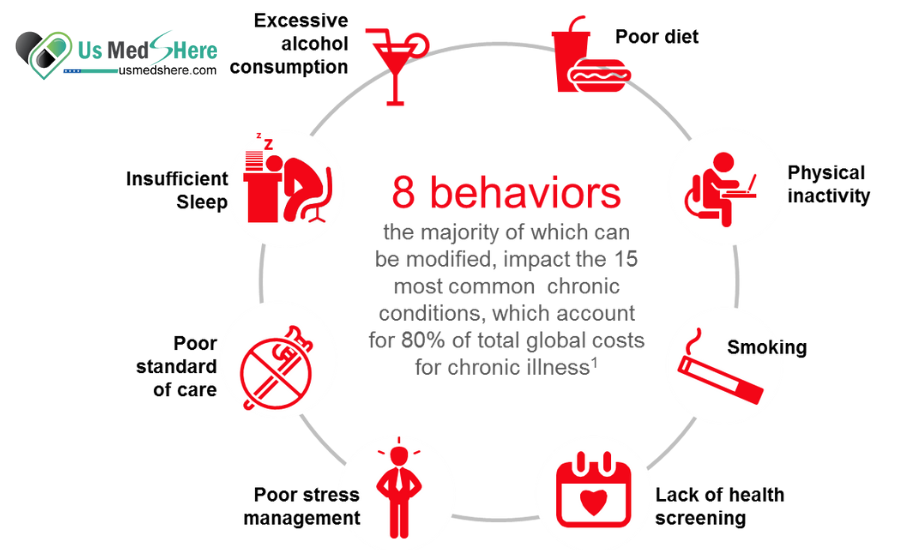
Health tips are important for maintaining overall well-being and preventing illnesses. Here’s why they’re crucial:
- Preventive Measures: Health tips often include advice on proper nutrition, regular exercise, adequate sleep, and stress management. Following these tips can help prevent various health issues such as obesity, heart disease, diabetes, and mental health disorders.
- Improved Quality of Life: By adopting healthy habits, individuals can experience a better quality of life. They may have more energy, better mood, improved cognitive function, and enhanced physical fitness, allowing them to enjoy daily activities and pursue their goals with greater ease.
- Reduced Healthcare Costs: Prevention is often more cost-effective than treatment. By following health tips and maintaining good health, individuals may reduce their risk of chronic diseases and avoid costly medical treatments, hospitalizations, and medications.
- Longevity: Healthy lifestyle habits can contribute to a longer lifespan and increased longevity. By avoiding harmful habits like smoking, excessive drinking, and poor dietary choices, individuals can lower their risk of premature death and enjoy more years of life with their loved ones.
- Disease Management: For those with existing health conditions, following relevant health tips can help manage symptoms, prevent complications, and improve overall health outcomes. This might include tips for managing diabetes, hypertension, arthritis, or other chronic diseases.
- Mental Health Benefits: Health tips often encompass practices that support mental well-being, such as mindfulness, relaxation techniques, and social connections. Prioritizing mental health is essential for resilience, coping with stress, and maintaining emotional balance.
What are the benefits of regular exercise?
Regular exercise offers a wide range of benefits for both physical and mental health:
- Improved cardiovascular health: Exercise strengthens the heart and improves circulation, reducing the risk of heart disease and stroke.
- Weight management: Regular physical activity helps control weight by burning calories and building muscle mass.
- Enhanced mood: Exercise stimulates the release of endorphins, neurotransmitters that promote feelings of happiness and reduce stress, anxiety, and depression.
- Increased energy levels: Physical activity improves stamina and endurance, leading to higher energy levels throughout the day.
- Better sleep: Regular exercise can help regulate sleep patterns and improve sleep quality.
- Stronger muscles and bones: Weight-bearing exercises such as resistance training and weightlifting help build muscle mass and increase bone density, reducing the risk of osteoporosis and frailty.
- Improved brain health: Exercise has been linked to better cognitive function, memory, and concentration, as well as a reduced risk of neurodegenerative diseases like Alzheimer’s.
What are some healthy snack options?

- Fresh Fruit:
- Apples, bananas, berries, oranges, or any seasonal fruits are great choices.
- Vegetables and Hummus:
- Carrot sticks, cucumber slices, or bell pepper strips paired with hummus for a satisfying and crunchy snack.
- Greek Yogurt with Berries:
- Choose plain, non-fat Greek yogurt and add fresh berries for a protein-packed and antioxidant-rich snack.
- Nuts and Seeds:
- Almonds, walnuts, pistachios, or pumpkin seeds provide a good source of healthy fats and protein.
- Whole Grain Crackers with Cheese:
- Opt for whole grain crackers and pair them with a small portion of cheese for a balanced snack.
- Edamame:
- Steamed edamame pods are a tasty and protein-rich option.
- Popcorn:
- Air-popped popcorn is a whole grain snack that can be made flavorful with a sprinkle of herbs or nutritional yeast.
Why are social connections important for health?
Social connections play a crucial role in overall health and well-being. Here are several reasons why maintaining strong social connections is important for health:
- Mental Health:
- Social interactions provide emotional support and companionship, reducing feelings of loneliness and isolation.
- Positive social connections contribute to improved mood and lower rates of depression and anxiety.
- Stress Reduction:
- Supportive relationships help buffer the effects of stress by providing a sense of security and understanding.
- Engaging in social activities can be a distraction from daily stressors.
- Physical Health:
- Strong social ties have been associated with better physical health outcomes.
- People with robust social connections may have lower blood pressure, a reduced risk of heart disease, and improved immune function.
- Longevity:
- Studies suggest that individuals with strong social support tend to live longer than those with limited social connections.
- Cognitive Function:
- Social engagement is linked to better cognitive function and a lower risk of cognitive decline as people age.
What are the ways to maintain health?
- Balanced Diet:
- Eat a variety of nutrient-rich foods, including fruits, vegetables, whole grains, lean proteins, and healthy fats.
- Pay attention to portion sizes and limit the intake of processed foods, sugary snacks, and excessive amounts of caffeine.
- Regular Exercise:
- Engage in regular physical activity, aiming for a mix of aerobic exercises (e.g., walking, jogging, cycling) and strength training.
- Strive for at least 150 minutes of moderate-intensity aerobic exercise or 75 minutes of vigorous-intensity exercise per week.
- Adequate Sleep:
- Ensure you get 7-9 hours of quality sleep each night.
- Establish a consistent sleep schedule by going to bed and waking up at the same time every day.
- Stress Management:
- Practice stress-reducing techniques such as deep breathing, meditation, yoga, or mindfulness.
- Take breaks, engage in hobbies, and prioritize activities that bring you joy.
- Hydration:
- Drink plenty of water throughout the day to stay hydrated.
- Limit the consumption of sugary drinks and excessive alcohol.
- Regular Health Check-ups:
- Schedule regular check-ups with healthcare professionals for preventive care.
- Stay up-to-date on vaccinations and screenings.
- Limit Alcohol and Tobacco:
- If you drink alcohol, do so in moderation.
- Avoid tobacco products and limit exposure to secondhand smoke.
- Sun Protection:
- Use sunscreen with at least SPF 30 to protect your skin from harmful UV rays.
- Wear protective clothing and sunglasses when exposed to the sun.
What effect does depression have on mental health?
Depression can have profound and pervasive effects on mental health. It affects various aspects of cognition, emotions, and behavior, contributing to significant distress and impairment in daily functioning. Here are some of the key effects that depression can have on mental health:
- Cognitive Impairment:
- Difficulty concentrating, making decisions, and thinking clearly are common cognitive symptoms of depression.
- Negative Thought Patterns:
- Depression often involves negative thought patterns, such as persistent feelings of worthlessness, guilt, and self-criticism.
- Memory Difficulties:
- Depressive symptoms can impact memory and the ability to recall information.
- Diminished Interest and Pleasure:
- Anhedonia, or the loss of interest and pleasure in activities, is a hallmark feature of depression. This can result in a lack of motivation to engage in previously enjoyable activities.
- Emotional Distress:
- Persistent feelings of sadness, hopelessness, and emptiness characterize the emotional experience of depression.
- Increased Anxiety:
- Depression often coexists with anxiety disorders, leading to heightened levels of worry and apprehension.
- Sleep Disturbances:
- Insomnia or hypersomnia are common symptoms of depression, disrupting the normal sleep-wake cycle and contributing to fatigue.
How can I prioritize my mental health?
Prioritizing your mental health is crucial for overall well-being. Here are some steps you can take:
- Self-care: Allocate time each day for self-care activities that you enjoy, such as reading, taking a bath, practicing mindfulness, or spending time in nature.
- Establish boundaries: Learn to say no to commitments or situations that cause excessive stress or discomfort. Set clear boundaries in your personal and professional life.
- Healthy lifestyle: Maintain a balanced diet, engage in regular physical activity, get enough sleep, and avoid excessive alcohol and drug use.
- Social support: Cultivate strong relationships with friends, family, or support groups. Social connections can provide emotional support and reduce feelings of loneliness.
- Stress management: Practice stress-reduction techniques such as deep breathing, meditation, yoga, or progressive muscle relaxation.
- Seek professional help: If you’re struggling with mental health issues, don’t hesitate to seek support from a therapist, counselor, or mental health professional.
How can I improve my lung health?
Improving lung health is crucial for overall well-being. Here are some tips to help maintain and enhance lung health:
- Quit Smoking:
- If you smoke, quitting is the single most effective way to improve lung health. Seek support from healthcare professionals or smoking cessation programs if needed.
- Avoid Exposure to Secondhand Smoke:
- Minimize exposure to secondhand smoke, as it can also contribute to lung damage and respiratory issues.
- Protect Against Environmental Pollutants:
- Limit exposure to air pollutants, such as vehicle exhaust, industrial emissions, and indoor pollutants. Use air purifiers if necessary.
- Exercise Regularly:
- Engage in regular aerobic exercise, which can strengthen your respiratory muscles and improve lung capacity.
- Practice Deep Breathing Exercises:
- Deep breathing exercises can help improve lung function and capacity. Consider techniques like diaphragmatic breathing or pursed-lip breathing.
How does sleep impact overall health?
Sleep plays a crucial role in overall health, and its impact extends far beyond simply feeling rested. Adequate and quality sleep is essential for various physiological and psychological functions. Here are some ways in which sleep influences overall health:
- Blood Sugar Regulation:
- Adequate sleep is important for maintaining healthy blood sugar levels and reducing the risk of type 2 diabetes.
- Sleep deprivation can lead to insulin resistance and impaired glucose metabolism.
- Pain Perception:
- Sleep plays a role in pain perception and the body’s ability to tolerate discomfort.
- Chronic pain conditions may be exacerbated by sleep disturbances.
- Hormone Regulation:
- Sleep supports the regulation of hormones such as growth hormone, which is essential for growth, development, and muscle repair.
- Mental Health:
- Sleep is closely linked to mental health, and sleep disturbances are common in individuals with mental health disorders.
- Prioritizing sleep can contribute to better emotional well-being and mental resilience.
- Performance and Productivity:
- Quality sleep is essential for optimal performance, productivity, and overall daytime functioning.
- Sleep deficiency can lead to decreased work efficiency, impaired concentration, and increased likelihood of errors.
What are the benefits of laughter for health?
Laughter is a natural and enjoyable activity that not only brings joy but also offers several health benefits. Here are some of the positive effects that laughter can have on overall health:
- Stress Reduction:
- Laughter triggers the release of endorphins, the body’s feel-good hormones, which can help reduce stress and promote a sense of well-being.
- Improved Mood:
- Laughing can elevate mood and contribute to a more positive outlook on life. It can be particularly beneficial in combating feelings of sadness or mild depression.
- Enhanced Immune Function:
- Laughter has been associated with improved immune system function. It may stimulate the production of immune cells and enhance the body’s ability to defend against infections.
- Cardiovascular Benefits:
- Laughter can have positive effects on cardiovascular health by improving blood flow and promoting relaxation. It may help lower blood pressure and reduce the risk of heart disease.
- Pain Relief:
- Laughter may act as a natural painkiller by increasing the body’s production of endorphins and promoting a sense of well-being.
How can I improve my cardiovascular health?
Improving cardiovascular health involves adopting a heart-healthy lifestyle that addresses factors such as diet, physical activity, and overall well-being. Here are some key strategies to enhance cardiovascular health:
- Maintain a Healthy Diet:
- Eat a well-balanced diet rich in fruits, vegetables, whole grains, lean proteins, and healthy fats.
- Limit the intake of saturated and trans fats, cholesterol, sodium, and added sugars.
- Control Portion Sizes:
- Be mindful of portion sizes to prevent overeating and manage caloric intake.
- Stay Hydrated:
- Drink an adequate amount of water throughout the day to support overall health.
- Regular Physical Activity:
- Engage in regular aerobic exercises such as brisk walking, jogging, swimming, or cycling.
- Aim for at least 150 minutes of moderate-intensity aerobic exercise or 75 minutes of vigorous-intensity exercise per week.
- Strength Training:
- Include strength training exercises at least two times a week to improve muscle strength and endurance.
- Maintain a Healthy Weight:
- Achieve and maintain a healthy weight through a combination of a balanced diet and regular exercise.
What are the reasons for poor health?

Poor health can result from a combination of various factors, and individual circumstances may vary. Here are some common reasons for poor health:
- Unhealthy Diet:
- Poor nutrition, including a diet high in processed foods, saturated fats, sugars, and low in essential nutrients, can contribute to various health issues.
- Lack of Physical Activity:
- Sedentary lifestyles and insufficient physical activity are linked to an increased risk of obesity, cardiovascular diseases, and other health problems.
- Tobacco Use:
- Smoking and the use of tobacco products are major contributors to poor health, increasing the risk of respiratory diseases, cardiovascular diseases, and cancer.
- Excessive Alcohol Consumption:
- Heavy or binge drinking can lead to liver diseases, cardiovascular issues, mental health issues, and other health complications.
- Chronic Stress:
- Long-term stress can negatively impact mental and physical health, contributing to conditions such as anxiety, depression, and various chronic diseases.
- Lack of Sleep:
- Inadequate or poor-quality sleep can affect overall health, impacting cognitive function, immune system function, and increasing the risk of various health issues.
- Genetic Factors:
- Genetic predispositions and family health history can influence an individual’s susceptibility to certain health conditions.






































Leave a Reply